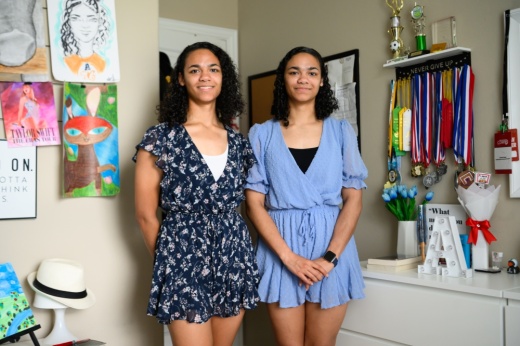Moving to so many different homes was difficult, especially since no one explained what was happening to them, Malaina Jones said.
Nichols and her partner, Christopher Jones, are licensed to foster children through Spring-based nonprofit Arrow Child and Family Ministries—which provides adoption and foster care services—and adopted the twins in November 2020.
Malaina and Alaina Jones lived with their birth mom a couple of times intermittently after they first entered the foster care system, Alaina Jones said. Moving to so many different homes was difficult, especially since adults didn’t always take the time to explain to them what was happening, Malaina Jones said.
“Going back to our mom, it was very hard on us again, because we were given that chance again, but it didn't work out,” Alaina Jones said.

“If we can ... keep kids to where we can get them back home ... we’ll normally get better outcomes,” he said.
Since 2015, when a federal judge deemed Texas’ child welfare system “broken,” lawmakers and government agencies have worked to improve the system. Efforts have included shutting down inadequate facilities, funding the hiring of more Texas Department of Family and Protective Services case workers and partnerships with nonprofits.
The DFPS reported a steady decline in the number of children in foster care over the past several years, correlating with state-level reform efforts.
In a nutshell
The Texas Legislature has approved several reforms in the state’s child welfare system over the past decade to address high caseload numbers and turnover rates among case workers, Community Impact previously reported.
The DFPS reports a 38% decline in Texas foster care children since 2015 while Harris County’s foster care population has dropped 49%.
“Over the last several sessions, this committee has taken a leading role in the historic transformation of the Texas child welfare system, and because of your work, Texas is now an example for the rest of the nation,” Andrew Brown, vice president of policy for the Texas Public Policy Foundation, said at a May 7 Texas Senate committee hearing.
Statewide, daily caseloads for case workers have gone from an average of 21.1 in 2015 to 11.8 in 2024, the DFPS reports. In Harris County, case worker turnover rates have remained around 25%, while Child Protective Services employee salaries are up 38%.
- December 2015: A federal judge declares the Texas foster care system is inadequate.
- May 2017: Senate Bill 11 creates the Child Protective Services Legislative Oversight Committee; House Bill 871 makes it easier for state agencies to work with faith-based organizations.
- January 2020-December 2021: Statewide, 21 facilities housing 13 or more children are shut down or have their licenses revoked.
- September 2021: The Texas Legislature funds $83.1 million in SB 1 to hire 312 caseworkers; HB 5 allots an additional $90 million to the DFPS.
- October 2021: Gov. Greg Abbott approves a new panel to analyze the rising number of foster care children without a placement.
- Jan. 29: Rep. Lacey Hull, R-Houston files House Bill 2216.
- June 2: 89th Texas Legislature ends.
Texas Education Agency data shows that the number of students in foster care and attending a public school district in Region 4—which covers a majority of the Greater Houston area—dropped by about 11% from 2017-25.
Data from the Family Freedom Project, a Texas-based nonprofit focused on defending parental rights and protecting families from government overreach, shows a shift in recent years, with Texas removing over 20,000 children from their homes in 2018 and just 9,220 in 2024—a 55% drop.
A big challenge for the child welfare system is a shortage of foster care parents who are trained to help children experiencing trauma, said Brandon Anderchuk, executive director of Hope’s Path. The nonprofit helps young men who have aged out of the foster care system.
“This lack of trained caregivers contributes to instability in the children’s lives, as they often encounter multiple placements throughout their time in foster care,” Anderchuk said.Who it affects
Brittany Valdez—a 22-year-old nursing student at Lone Star College-University Park who entered foster care around age 15—said she wishes biological parents could get more support before their children are removed. Valdez said her mother struggled financially for years before her parental rights were terminated, but Valdez always had food and a place to sleep.
“She just needed help. ... Because she had a tough childhood as well, so she only followed what she learned from as a child,” Valdez said.

Operation Achieve Independence has helped Valdez and many other students prepare for college, founder and President Tina James said.
“The problem with the resources out there is sometimes there’s so much red tape that the young adults just freeze up,” James said.
Also of note
Alongside local agencies, state leaders are working to address challenges in the system.
House Bill 2216, filed this session by Rep. Lacey Hull, R-Houston, would raise the threshold for removing children from their birth families.
The bill aims to extend the provisions under the federal Indian Child Welfare Act to all Texans. The ICWA requires strong evidence before Native American children are removed and prioritizes placement with family or tribal communities.
HB 2216 would raise the standard for terminating parental rights and emphasize placing children with relatives whenever possible.
The bill passed 140-4 in the Texas House on April 23 and was moving through the Texas Senate as of press time. While the bill has received support, some have said it raises safety concerns.
“As a parent of adopted children, I’m especially aware of the potential risks and consequences my children could have faced if reunification were enforced by the courts,” Anderchuk said.
Get involved
Arrow officials said every city and county across the state has an “urgent need” for foster care families, particularly for those willing to welcome children with intellectual and developmental disabilities as well as children over age 8.
But fostering and adoption aren’t the only ways locals can support children in the welfare system and the organizations serving them.
“I love to see a community rally around their kids, and there’s always something that every person can do to help in the child welfare system,” Lundy said.
James said Operation Achieve Independence educates volunteers about supporting children who have lived through trauma.
“The kids you work with with that foster care history—a lot of them were very angry, very frustrated, very guarded. ... But you’ve got to just give them grace and develop that relationship,” James said.
Local organizations offer the following support services for individuals in and aging out of the foster care system:
1. Arrow Child and Family Ministries
- Adoption facilitation; foster parent support
- Behavioral health help and in-home therapy
- Residential community for women ages 13-21
- In-school support
- Residential program for young men who have aged out of foster care
- Life skills and financial literacy classes
- Job placement and college assistance
- Transitional living support
- Education, career prep, guidance and mentorship for those in and who have aged out of foster care
- Temporary and permanent homes for children in need
- Resources and training for foster parents
- Medical, therapy and educational services







